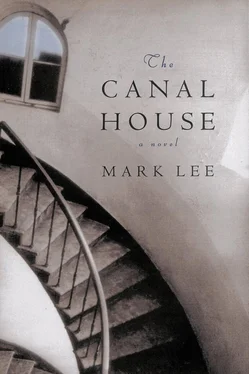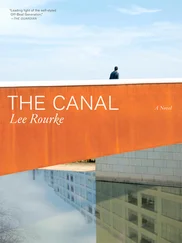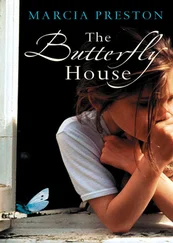The car passed between two stone pillars and followed a tarmac driveway up the hill. The castle was really a collection of buildings—a square tower at one end, a round tower near the middle, and then a great hall with three floors of arched windows. Everything was connected to a gray stone manor house that had a steep slate roof. Four triangular pennants flew from the corners of the square tower and each one displayed the advertising logo of the Riverside Bank.
“Who built this?” Daniel asked.
“Henry the Eighth. At least that’s what we tell the American tourists when they show up with their cameras. Actually it was thrown up around 1860 by a crazy bugger named Robinson who loved reading Walter Scott. He pissed away a fortune building the place, then fell off one of the towers and broke his neck. The previous owners were going to turn it into a health spa, but Mr. Seaton bought the property and did a complete renovation.”
We crossed a bridge over a dry moat, passed through the barbican, and entered the front courtyard. We got out of the car and Billy told us to leave our luggage in the trunk. As we followed him around the corner of the great hall, he pointed out the heating vents concealed by shrubbery and an ancient-looking pump house that contained the feeder lines for fiber-optical cables. “All modern. Everything modern,” he kept saying, as if we didn’t believe him.
Crossing the back lawn, we heard the sharp whack of a tennis racket hitting a ball and approached a red clay court. Richard and Julia were playing tennis against another couple. Since Kosana, I had held images of Julia in my mind. I remembered her inoculating the refugee children and washing blood off her arms in the medical tent. It was jarring to see her in a completely different setting. She wore tennis shoes, sky blue tennis shorts, and a white sweater.
A middle-aged butler stood next to a portable serving table crowded with bottles of water and fruit drinks. His head swung back and forth like a metronome with each volley of the ball.
A young couple sat together on a wooden bench. The man was in his thirties with the rumpled appearance of an undergraduate. The blond woman beside him wore a let’s-go-tramping-across-the-moor skirt-and-sweater set. Engrossed in the tennis match, they both leaned forward with a perkiness that reminded me of college cheerleaders. Whenever someone on the court scored a point or made a good save, they shouted encouragement.
Another guest in his late sixties stood a few feet away from the young couple. The man’s brown suit and sweater vest were shabby and stained. His thinning hair failed to conceal his bald spot. He looked like an unemployed hotel clerk who had accidentally been invited to the party.
Julia saw us and waved. The ball flew back over the net and she continued playing. The other couple on the tennis court had more experience working as a team. They were in their late fifties but in good shape, as bright-eyed and sleek as otters. The man had pale skin and reddish hair that looked like a wave about to break. His wife was small and strong, an aggressive player.
The volley between the two couples became fairly intense until the small woman hit a backhand that bounced between Richard and Julia.
“That’s enough. You’re too good for us,” Richard said.
Still holding her tennis racket, Julia passed through the gate. “Hello, Nicky. Hello, Daniel. It’s wonderful to see you both again.” Julia and Daniel glanced at each other, then looked away. It was that same awkwardness I’d seen between them in the staff tent at Kosana.
Richard joined us and shook my hand. “There you are. Glad you two made it. I promise, no Righteous Armies this weekend.”
Wallace, the butler, served drinks while Richard introduced us to the other guests. The sleek couple was in the current government. George Riverton was the international development secretary, the politician who had supported Hand-to-Hand’s first effort in Uganda. His wife was named Jacqueline, but everyone called her Jax. She worked in the foreign office and I remembered seeing her on various television talk shows.
The young couple was also involved in politics. Malcolm Barthorp was the MP for a West London suburb. His wife, Connie, raised their children and organized pocket gardens in poor neighborhoods. Both the Rivertons and the Barthorps laughed at Richard’s jokes and nodded when he spoke. They had obviously decided that Richard had some sort of political future and they were eager to become his supporters.
The man in the shabby brown suit stayed away from the introductions. Suddenly, Richard swung around and gestured to him. “And this is our good friend, Digran Petrosyan.”
I had heard Digran’s name before, but I couldn’t recall why. I glanced at Daniel—Help me out here—then Connie stepped forward and grinned. “Isn’t it exciting to have Mr. Petrosyan here? Richard got him out of prison six days ago.”
“Actually, Jax and the foreign office had quite a lot to do with it,” Richard said. “I just provided some moral support.”
“And your jet,” Malcolm said. “Don’t forget the corporate jet. You got him out of Armenia before they changed their minds.”
Political prisoner, I thought. Older man. And then I remembered. Digran Petrosyan was the world-famous poet and candidate for the Nobel Prize. When he called for a peace agreement between his country and Azerbaijan, the Armenian government sent him to prison. During the last few years, he had been a poster boy for the Amnesty International crowd.
The poet nodded to Richard and Jax. “I thank you,” he said with a whispery voice. “I thank everyone for their assistance.”
Everyone smiled politely. I felt sorry for the guy. A week ago he was sitting in a cell staring at a crack in the wall and now he was at Westgate Castle with Richard’s butler hovering behind him. When deep-sea divers come up too fast, they get the bends.
We finished our drinks and crossed the lawn to the manor house. Julia turned to Daniel as we walked together. “Richard said you were in Italy.”
“Yes. I own a small farm there.”
“And you actually grow things?”
“Olives. Vegetables. Nicky helped me dig up three sacks of onions.”
Richard left the Barthorps and caught up with us. “The party on Saturday is a fund-raiser for Hand-to-Hand, but up until then we can have some fun. Wallace will show you to your rooms. Drinks at seven. Dinner around eight-thirty. You’re welcome to come pheasant shooting with us tomorrow morning.”
“Think I’ll sleep in late,” said Daniel.
“I used to hunt when I was younger,” I said. “We’d drive out to my uncle’s ranch.”
“You’ll find this a bit more organized.” Richard turned to the butler. “Wallace, find a jacket and boots for Mr. Bettencourt and tell Quinn we’re adding another gun.”
The butler led Daniel and me upstairs to our rooms in the west wing of the manor house. Recessed lights in the hallways illuminated a series of eighteenth-century paintings. A man holding the reins to a dappled horse. Two bare-knuckled prizefighters posing in a field.
“Nice place,” I said.
“The whole building was gutted like a fish,” said Wallace. He had a strong northern accent. “Pulled out the innards. Stuffed in something new.”
My room was small, but it had a view of the castle’s herb garden. Richard’s elves had already brought my suitcase up from the Jaguar. The bathroom was decorated with framed prints and lots of Italian tile. The mattress on the bed was firm enough to bounce a coin yet the rest of the furniture was cracked and faded. I inspected a mirrored armoire, an easy chair, and oak shelves crammed with turn-of-the-century agricultural books. A pewter mug filled with white roses was on the side table along with photographs of people from the 1940s and 1950s.
Читать дальше












